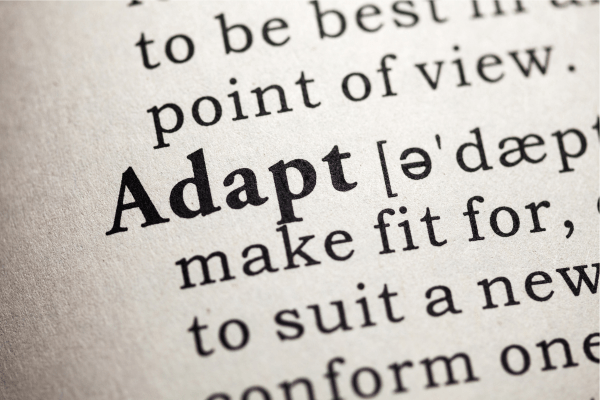The AQai framework has a key dimension of Ability. These are five different subdimensions where you can build your skills and equip yourself better to be adaptable. When I talk to people about changing their adaptability, by building their skills, it’s amazing how some very simple interventions can start to shift the dial.
Resilience
If we think, for example, of an environment in which there is constant challenge and push back, or there’s lots of change and disappointment, then by strengthening your Resilience (bounce-back-ability), you can be much better equipped to deal with those disappointments. Simply by breaking down outcomes into much small steps, it is possible to celebrate the success of the small steps rather than becoming overwhelmed by failure to achieve the final outcome. Facing the challenge of ‘two steps forward, one step back’, you can build up your Resilience Ability to recover from the ‘one step back’ by keeping each step small and recognising the progress of the ’two steps forward’.
Developing your Resilience can also be supported by improving your Mindset (see below).
However, it is important to separate the Ability of Resilience from the Environment indicators that can undermine your capability to respond to change. If your Work Stress is high or your Emotional Health is low then these internal environment factors will need to be addressed before you can expect to see an impact in your increased Resilience Ability.
Grit
By contrast, I talk to others who have got very low Grit. This can often be because they lack the long-term goals that means they push through to achieve them. The issue for them is that they need to establish clear ambition and commitment to outcomes that matter to them. Helping them to understand what they want and to believe that they can have it, provides the motivation to develop their Grit.
Too often, they tell me that they believe they have Grit because they have survived adversity. Although, this might reflect the popular perception of Grit, within the AQai framework Grit is not about just surviving. Grit is about finding a way through difficulties to pursue long-term goals. When I dig deeper, they often have a pattern of getting started but failing to complete. Their initial motivation isn’t strong enough that they tackle the roadblocks to progress.
Mindset
In my experience one of the easiest improvements to Ability is to strengthen Mindset. People with low Mindset tend to see the world with the glass half empty, rather than the glass half full. Often a technique as simple keeping a gratitude journal can rapidly shift them to an increasingly positive Mindset. With a more positive Mindset, they will be more able to recognise positive experiences and new opportunities. When this is reinforced by embracing these experiences and opportunities with gratitude, a virtuous circle of Mindset improvement can build.
Unlearn
The Ability that people most struggle to improve is Unlearn. Our education system is dominated by test and examinations that are predicated on a ‘right answer’ and a ‘right way’. Once you buy into the idea that things are right or wrong, then the Ability to Unlearn appears to be self-contradictory. Our polarising political and religious cultures seek to frame right and wrong as either/or choices. With the complexity and ambiguity of our VUCA (Volatile, Uncertain, Complex, Ambiguous) world we seek the reassurance of constancy and certainty. Unlearn is the discipline of ‘both/and’.
With Unlearn you can become comfortable with paradox, mystery and the unknowable. Ironically, the most effective way I have seen people transform their Unlearn is by learning the skills of dramatic improvisation. Several of my clients have learnt to embrace ‘not only … but also’ by participating in a beginners’ improv class. Apart from the enjoyment of deliberate mischief making and laughter at the unexpected, improvisation has opened their minds and bodies to completely new ways of engaging with ideas and with others. To do this they have had to ‘Unlearn’ their attitudes to ‘getting it wrong’ or ‘getting it right’. They have had to embrace the ridiculous while holding strong to a new discipline. They have found new ways of seeing themselves and other.
One step at a time
As I work with people to improve their AQai adaptability scores I have discovered that the crucial thing is to focus on one subdimension at a time. You should build up a single ability over a minimum of 90 days. This gives you the time to establish fresh habits in the way that you operate. It’s only when you embed fresh habits that you can sustain improvement. Just having a one-off project to learn something is not enough. You have got to embed it in both your behaviour and your personal outlook. You may be sceptical as to whether improving your AQai Ability will help you to better adapt to change. Over more than 20 years, I have worked with individuals facing the challenge of change. As I reflect on their Adaptability profile as understood by the AQai framework, it is clear to me why some people adapt successfully and others struggle to survive.

Charles McLachlan is the founder of FuturePerfect and on a mission to transform the future of work and business. The Portfolio Executive programme is a new initiative to help executives build a sustainable and impactful second-half-career. Creating an alternative future takes imagination, design, organisation and many other thinking skills. Charles is happy to lend them to you.
